Vitamin E is an essential nutrient that is a potent antioxidant and may help improve both heart health and eye health. It’s one of the most heavily-researched vitamins out there, so there is an incredible amount of scientific research detailing its potential benefits.
There’s also a wide range of vitamin E supplements on the market, and it can be hard to discern what to look for.
Luckily, our research team has reviewed and ranked the ten best vitamin E supplements, plus taken a detailed look at the most current nutritional research on vitamin E.
Research
Rankings
1. Garden of Life Vitamin Code Raw Vitamin E
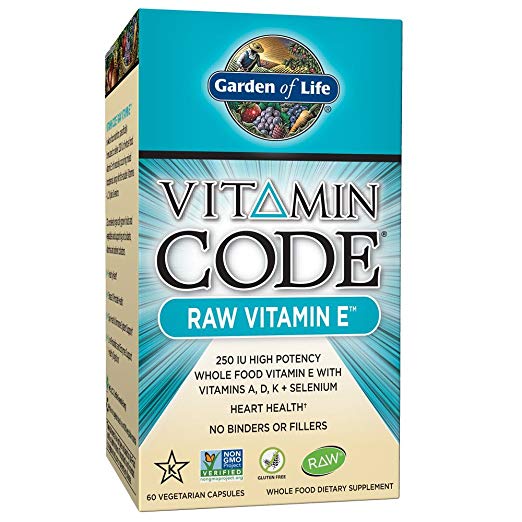
One of the biggest paradoxes in the scientific research on vitamin E is the disconnect between the observed health benefits of people who eat a diet that is naturally high in vitamin E, and the lack of benefits observed in many clinical trials of synthetic vitamin E.
One potential explanation for the difference is other phytonutrients that are present alongside natural foods that are rich in vitamin E.
Garden of Life is one potential way to surmount this limitation of normal supplements—it contains 125 IUs of vitamin E alongside a raw fruit and vegetable blend, plus probiotics and enzymes to aid with digestion and bioavailability.
Of course, if you are looking to supplement your diet with vitamin E in isolation, this is not the best choice, but for those looking for an optimally-dosed vitamin E supplement alongside a well-rounded collection of other phytonutrients, Garden of Life is an excellent option.
2. Solgar Vitamin E
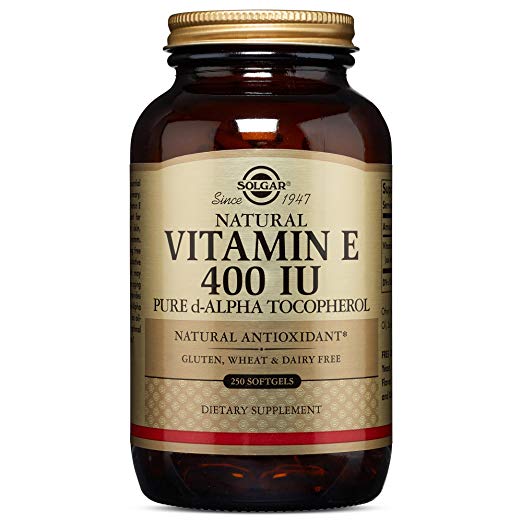
Solgar Vitamin E is a supplement that provides pure alpha-tocopherol dissolved in a mixture of safflower oil and soybean oil.
The capsules are gelatin based, and aside from the soy content, the ingredients are certified free of other allergens like gluten and dairy.
At 400 IUs of vitamin E per capsule, it has a formidable dosage. Thanks to its quality composition and its strong dosage, it’s an excellent choice.
3. Amazon Elements Vitamin E
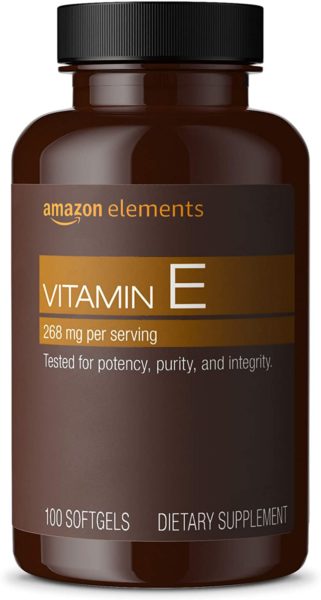
Amazon Elements Vitamin E is a is a basic vitamin E supplement that uses a mixture of alpha, beta, gamma, and delta tocopherols. Each gelatin-based softgel provides 400 IUs of vitamin E, which is dissolved in soybean oil.
Those looking to avoid soy, and those who are strict vegetarians and vegans, will want to opt for something else, but if these relatively minor issues don’t concern you, it’s a solid choice.
4. Pure Encapsulations Vitamin E
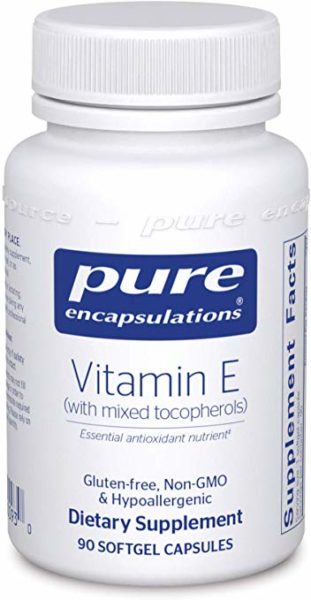
Pure Encapsulations Vitamin E delivers a mixture of tocopherols for its 400 IU dosage of vitamin E, contained within a gelatin capsule and dissolved in a blend of rapeseed oil and sunflower oil.
These vegetable oils help ensure good bioavailability, making this vitamin E supplement a good option.
5. Eden’s Semilla Vitamin E Oil
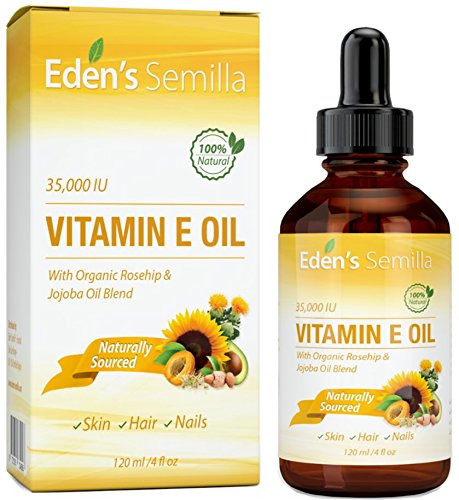
For treating skin and scar tissue, Eden’s Semilla Vitamin E Oil is a great choice. This liquid vitamin E solution uses a blend of vegetable oils including sunflower, sweet almond, apricot, and jojoba oil.
These oils serve as the delivery vehicle for a concentrated topical treatment that can be applied to your skin, nails, or even hair. Its all-natural ingredients make it an attractive option as a topical vitamin E supplement.
6. NusaPure Vitamin E
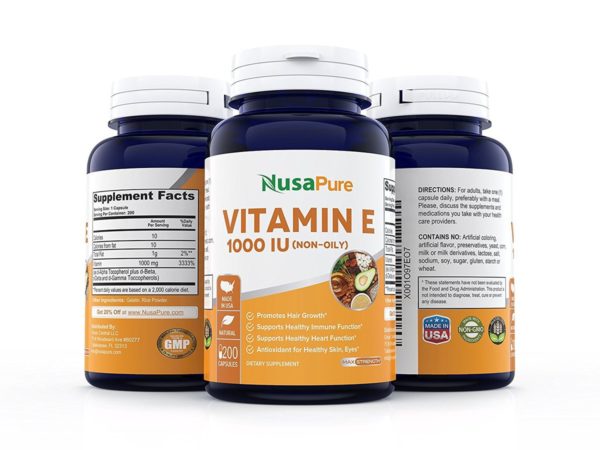
If you are intent on megadosing vitamin E, NusaPure Vitamin E is the best option. Each capsule has 1000 IUs of vitamin E, which is delivered as mixed tocopherols in a gelatin capsule.
The bioavailability of the vitamin E may be harmed somewhat by the lack of a high-quality vegetable oil, but this minor downside is offset by the very large dose in each capsule.
7. Deva Vegan Vitamin E
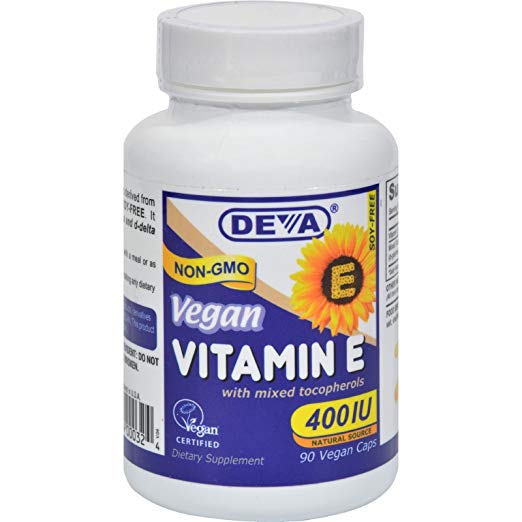
Deva Vegan Vitamin E is one of the few truly vegan-friendly vitamin E supplements on the market. It delivers the standard 400 IU dosage of alpha tocopherol, but uses vegan-friendly cellulose for the capsule. Moreover, unlike other vegan vitamin E supplements, it actually dissolves the vitamin E in oil, meaning it’s got superior bioavailability compared to these other “dry” vitamin E supplements.
8. NOW Foods Natural E-400
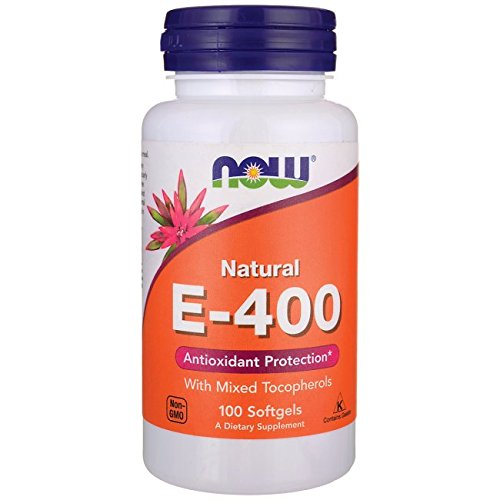
NOW Foods E-400 use a mixture of different tocopherols to deliver its 400 IU dosage. The capsules are gelatin-based, and while they use vegetable oil as a solvent for the vitamin E, it’s not a high-quality vegetable oil like some of the other competitors on the market.
In the grand scheme of things, this does not likely make a huge difference, but it still knocks NOW Foods down a bit in the rankings.
9. Health Priorities Vitamin E Enhance
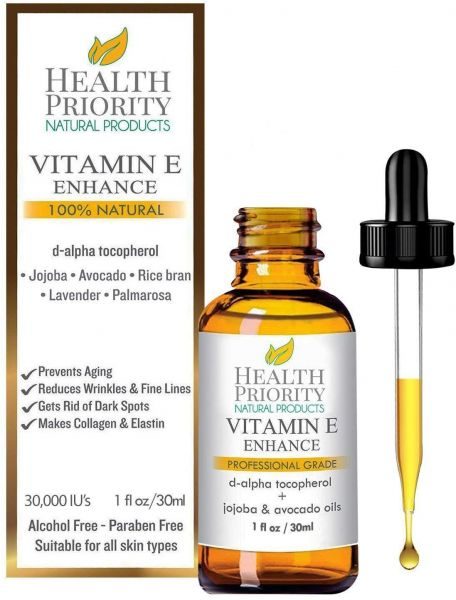
Health Priorities Vitamin E Enhance is a liquid vitamin E supplement meant for skin, nails, and hair. It uses an oil-based solution to deliver a concentrated dose of vitamin E, and also provides additional herbal ingredients like lavender and palmarosa.
While some people might seek out these ingredients, these extra plant extracts do increase the potential of an adverse skin reaction. If you have sensitive skin, it may not be the best option.
10. Kirkland Signature Vitamin E
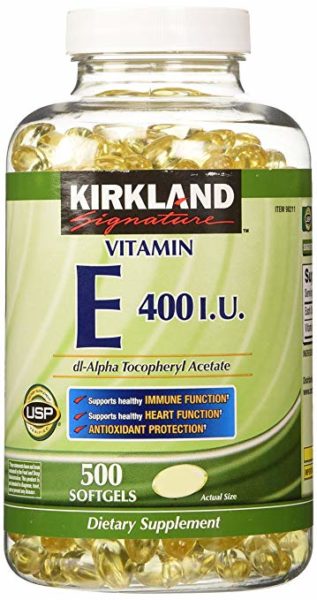
Kirkland Signature is well-known for providing simple and effective supplements, but in this case, the simplicity of the ingredients subtracts slightly from the efficacy of the supplement.
It contains 400 IUs of vitamin E inside a gelatin-based softgel, but unlike other competitors, it does not use any type of natural vegetable oil as a solvent for the vitamin E.
Since vitamin E is a fat-soluble compound, this could lead to somewhat lower bioavailability in your system, so while the dosage is great, its absorption might not measure up to the other options out there.
Category winners
Best vitamin E overall: Garden of Life Vitamin Code Raw Vitamin E
Garden of Life excels at providing vitamins alongside the complementary phytonutrients you’d find in a natural source. This supplement gives you vitamin E alongside extracts from beets, broccoli, carrots, and spinach, to name just a few. With this variety, it’s an easy choice for our overall top pick.
Best vitamin E for skin: Eden’s Semilla Vitamin E Oil
For rejuvenating aged, wrinkled, or sun-damaged skin, you can’t go wrong with Eden’s Semilla. It provides vitamin E in a hydrating blend of rosehip and jojoba oil, providing both antioxidant protection and moisture.
Best vitamin E for inflammation: Garden of Life Vitamin Code Raw Vitamin E
Need a boost to your body’s anti-inflammatory and antioxidant capabilities? Garden of Life is the way to go. It provides vitamin E from natural plant sources, alongside vitamin K, selenium, vitamin D3, and vitamin A to complement the antioxidant power of vitamin E.
Best vitamin E for scars: Eden’s Semilla Vitamin E Oil
Eden’s Semilla is our choice for healing scars, thanks to its high concentration of vitamin E (35,000 IU) and its use of jojoba oil, a top-tier skin moisturizer that provides strong antioxidant protection of its own. There’s no better choice for acne scars and other skin blemishes.
Best vitamin E for hair growth: Eden’s Semilla Vitamin E Oil
With Eden’s Semilla Vitamin E Oil, you can apply nutrients right to the source—the high concentration of vitamin E helps your hair follicles produce thicker, stronger, and properly moisturized hair. Just a few drops massaged into your scalp will go a long way towards thicker and healthier hair.
Best vitamin E for people on a diet: Solgar Vitamin E
People on a diet may struggle to get enough vitamin E, especially if they’re cutting out sources of vitamin E like nuts, oils, and seeds. For these users, Solgar Vitamin E is perfect for simple, easy supplementation—it delivers 400 IU of vitamin E in a basic, no-nonsense gelatin capsule.
Who Should Take Vitamin E?
Vitamin E is great for the aging population since it helps to combat wrinkles and aging skin. Furthermore it helps restore the youthful glow from skin that’s been damaged by the sun. Vitamin E can also help reduce the appearance of scars on the skin, whether from acne or other causes.
Vitamin E is also popular for reducing inflammation and oxidative damage in the body, thanks to its role as a powerful natural antioxidant.
How We Ranked
We first considered the amount of vitamin E found in each supplement. vitamin E-only supplements usually contain 100 to 1,000 IU per serving, whereas most once-daily multivitamins provide about 30 IU of vitamin E. Research suggests that a more appropriate dose is in the neighbourhood of 150 -400 IUs per day. As such, we preferred products like Garden of Life Vitamin Code Raw Vitamin E that’s on the lower end of the dosage, just to be safe. In the case of vitamin E, more is not always better – especially since your body can have a difficult time getting rid of any excess vitamin E.
It was also important to consider the form of vitamin E. Vitamin E is actually the name of eight related compounds in food. Each form has a different potency, or level of activity in the body. Synthetic vitamin E is commonly listed as ”dl-alpha-tocopherol.” whereas vitamin E from natural sources, is often listed as ”d-alpha-tocopherol” on food packaging and supplement labels. The natural form is more potent (For example, 100 IU of natural vitamin E is equal to about 150 IU of the synthetic form), which is why we ranked products like Garden of Life Raw Vitamin E highly.
Some vitamin E supplements provide other forms of the vitamin, such as tocotrienols, mixed tocopherols, and gamma-tocopherol. According to research, it’s unclear if any of these forms are superior to alpha-tocopherol in supplements, which is we chose to omit any product with these types of forms.
The delivery method was also an important factor in our rankings. There are 2 main ways to consume vitamin e: orally and topically. Oral vitamin E, like NOW Foods Natural E-400, is great for providing a lot of the interior benefits such as heart disease protection and lowering blood pressure. Topical vitamin E, like Eden’s Semilla Vitamin E Oil, is better for skin related issues, like repairing photo damaged skin, repairing stretch marks and preventing wrinkles. We decided to include both forms in our rankings because neither is better or worse than the other, just different.
Benefits
Vitamin E plays a key role in protecting your body from oxidative damage. Vitamin E is an essential vitamin that’s used by your body to protect against antioxidants, as a key ingredient for synthesizing strong skin, nails, and hair, and plays a role in maintaining vision as well.
However, it’s a controversial supplement, due to conflicting scientific research—some of the research points to a benefit, while other research indicates that high doses of vitamin E could actually be harmful.
Supplementing with vitamin E may improve blood vessel function, especially if your diet is deficient in vitamin E. Given that vitamin E is one of the most heavily-researched supplements on the market, there is a wealth of information on how vitamin E supplementation affects specific bodily functions in different types of special populations (such as older adults, men, women, etc).
One study published in 2015 suggests that vitamin E can effectuate beneficial changes in blood vessel function, but only in some situations.
The paper, published in the British Journal of Nutrition, aggregated the effects of several studies on vitamin E and vitamin C supplementation on blood vessel function (1). The results showed that vitamin E supplementation was effective at improving blood vessel function, but only when people were not also taking a vitamin C supplement.
Thus, there seems to be some negative interaction between high doses of vitamin C and vitamin E that prevents the beneficial effects on blood vessels from manifesting. While it’s not clear why this might be, the evidence in this study was pooled from several different trials, which strengthens the case that vitamin C and vitamin E have some type of interaction when supplemented together.
Additionally, the researchers found that supplementation with vitamin E was more effective in people with low vitamin E levels in their blood—this makes sense, as they would likely benefit more from supplementation if their diet was low in vitamin E to begin with.
From these findings, we can infer that people whose diet is low in foods like nuts, seeds, and green leafy vegetables (some of the best natural sources of vitamin E) would be more likely to see blood vessel function improvement from a vitamin E supplement.
Vitamin E may help improve blood glucose control when you are dieting. Going into caloric deficit, such as when you are on a weight loss program, puts considerable stress on your body.
This stress can potentially counteract some of the benefits of weight loss (at least in the short term), but some research suggests that vitamin E could help combat some of these adverse effects thanks to its antioxidant power.
A study published in 2018 examined how the antioxidant abilities of vitamin E would interact with the stress induced during caloric deficits (2). Using lab rats, the researchers studied how well blood sugar was controlled over the course of a period of dietary restriction either with or without vitamin E supplementation.
The result showed that the vitamin E supplementation was able to modulate blood sugar levels, albeit through a different mechanism than caloric restriction.
While these results are preliminary, they do suggest that vitamin E could be useful for people who are on a diet, particularly if they are also trying to avoid blood sugar dysregulation. This could be particularly beneficial for people who are trying to control metabolic syndrome, which is characterized by poor blood sugar control and excess body weight.
Side effects
Vitamin E was heavily studied in the 1990s and early 2000s for potential use as a broad-spectrum supplement to prevent diseases like heart disease and cancer.
Unfortunately, the results were somewhat disappointing—vitamin E, even at high doses, failed to exert a protective effect against many of these diseases on a population scale, and some research even found that it was harmful.
According to a review article published in the Annals of Internal Medicine, high doses (400 IUs or more) of supplemental vitamin E was associated with an increase in all-cause mortality among 135,000 patients across several clinical trials (3). While these trials were limited to people who were generally already sick, it suggested that doses below 150 IUs per day are safer.
Vitamin E is also not recommended during pregnancy, according to findings published by the Cochrane Collaboration (4).
Infants whose mothers took a vitamin E supplement during pregnancy are no better off than those whose mothers did not take vitamin E, and some evidence suggests that it may increase the risk of abdominal pain and other undesirable side effects during pregnancy.
Finally, athletes who are undergoing intensive training should not take a vitamin E supplement. Research conducted in both strength athletes and endurance athletes has demonstrated that vitamin E blunts the body’s adaptation to training (5, 6).
The reasons for this appear to be linked to the antioxidant ability of vitamin E—since exercise induces oxidative damage, a vitamin E supplement actually prevents some of the necessary damage that stimulates the body to adapt and improve.
Recommended dose
While commercially available vitamin E supplements are almost exclusively available in high doses (400 IUs or greater), research actually suggests that a more appropriate dose is in the neighborhood of 150 IUs per day, or somewhat lower.
This is based on research from large clinical trials, though, and there are still unanswered questions when it comes to the best dosage for particular needs, such as controlling blood sugar while dieting.
FAQ
Q: What are the benefits of taking vitamin E?
A: The benefits of taking vitamin E supplements include better eye health, prevention of systemic inflammation and coronary heart disease, boosting immune function and possibly lowering the risk of cancer.
Q: What types of food are high in vitamin E?
A: Vitamin E is an antioxidant that occurs naturally in foods such as nuts, seeds, and leafy green vegetables.
Q: What are some possible side effects of vitamin E supplementation?
A: Some possible side effects of vitamin e supplementation include headache, dizziness, weakness, fatigue, diarrhea, stomach cramps, bleeding, and easy bruising.
Q: How much vitamin E should I take?
A: Based on research from large clinical trials, there are still unanswered questions when it comes to the best dosage for particular needs, such as controlling blood sugar while dieting. While commercially available vitamin E supplements are almost exclusively available in high doses (400 IUs or greater), research actually suggests that a more appropriate dose is in the neighborhood of 150 IUs per day, or somewhat lower.
Q: Does Vitamin E lighten skin?
A: Applying vitamin E onto the skin helps increase nutrient levels which can help lighten skin in certain situations.
Q: Does Vitamin E help you sleep?
A: Studies show that vitamin E can help sleep by relieving common insomnia causing issues like restless leg syndrome, hot flashes and night sweats.
Q: Is vitamin E dangerous?
A: Vitamin E, in general, is not dangerous. However, high doses can increase the risk of bleeding, which can be dangerous if you are undergoing surgery.
Q: Does vitamin E raise blood pressure?
A: No, in fact it’s the opposite. Vitamin E supplementation at 200 IU/day can be effective in improving blood pressure in mild hypertensive patients.
Q: Is vitamin E safe to apply on your face?
A: Yes, vitamin E is safe to apply on your face. Applied topically, it may be effective at reducing UV damage in skin and help nourish the skin overall.
Q: Does vitamin E help hair grow faster?
A: Due to its natural antioxidant effects (which help to reduce free radicals and oxidative stress that cause hair follicle cells in a person’s scalp to break down), vitamin E could assist with maintaining and improving hair growth by supporting a healthy scalp.
Q: What is another name for vitamin E?
A: Other names for vitamin E include d-alpha tocopherol, which may be followed by the words acid succinate, acetate, or succinate.
Q: Do eggs have vitamin E?
A: Yes, eggs do contain vitamin E. Eggs contain small amounts of virtually every mineral or vitamin, including potassium, calcium, manganese, iron, folate, and zinc.
Q: Is vitamin E good for your heart?
A: Yes, vitamin E is good for your heart. In vitro, vitamin E has been shown to prevent atherosclerotic plaque formation and increase oxidative resistance in animals. Furthermore, foods rich in vitamin E has been associated with lower risk of coronary heart disease.
Q: Can I sleep with vitamin E oil on my face?
A: Yes, you can sleep with vitamin E oil on your face and can be used overnight as an anti-aging treatment. You should apply it well before bed however since it has a thick consistency and takes time to absorb.
Q: Is vitamin E good for your liver?
A: A meta-analysis of five clinical trials showed that vitamin E is good for your liver. It can significantly improve liver function in patients with non-alcoholic fatty liver diseases (NAFLD) including non-alcoholic steatohepatitis (NASH) (3).
Q: What causes low vitamin E?
A: Malnutrition is a main cause of low vitamin E, but there is also Abetalipoproteinemia, which is a rare inherited disorder of fat metabolism that results in poor absorption of dietary fat. Vitamin E deficiency associated with Abetalipoproteinemia causes problems such as muscle weakness and poor transmission of nerve impulses.
Q: Is vitamin E good for men?
A: Yes, vitamin E is good for both men and women of all ages. Pregnant women and infants are the exception.
Q: How do I apply vitamin E to my hair?
A: To apply vitamin E to your hair, mix 2 tbsps of jojoba oil with 3 capsules of vitamin E oil. Massage it onto your scalp and leave the mixture on overnight. In the morning, rinse it off with cold water.
Q: How can I get vitamin E naturally?
A: Vitamin E is found in foods that contain fat including avocado, nuts, seeds, wheat germ and vegetable oils. Certain species of fish and some dark leafy greens are also good sources of vitamin E.
Q: What is the maximum dose of vitamin E per day?
A: Although the data is limited, doses of up to 1,500 mg/day of the natural form of vitamin E appear to be safe.
Q: How many forms does vitamin E occur in?
A: Vitamin E occurs in 8 different forms. The most common form, found in various foods and supplements is d-alpha-tocopherol.
Q: Does vitamin E protect your eyes from free radicals?
A: Yes eye vitamins containing vitamin E can protect your eyes from free radicals. Many eye conditions are caused by excess free radicals, and vitamin E is a powerful antioxidant that naturally helps defend the body from fresh radical damage. Studies have even shown that diets including nuts, salmon, and avocado, which are high in vitamin E, slowed the development of cataracts (5).
Q: Is vitamin E considered a blood thinner?
A: Yes vitamin E is consider a blood thinner because it reduces blood clotting in a few different ways – although these effects depend on the amount of vitamin E a person takes. It is not recommend to supplement with vitamin E before, during or after surgery.
Q: Does Vitamin E clear dark spots?
A: Yes, vitamin E can help clear dark spots by repairing skin collagen.
Q: Does Vitamin E thicken hair?
A: Vitamin E helps improve blood circulation to the scalp which will ultimately result in a healthier scalp and possibly thicker hair.
Q: What is vitamin E?
A: Vitamin E is a group of eight fat soluble compounds that include four tocotrienols and four tocopherols.
Q: How is vitamin E thought to play a role in reducing the risk of heart disease?
A: By soaking up free radicals (which are harmful oxygen compounds), vitamin E could prevent cancer and heart disease.
Q: Is vitamin E better taken orally or topically?
A: Oral vitamin E is great for providing a lot of the interior benefits such as heart disease protection and lowering blood pressure. Topical vitamin E is better for skin related issues, like repairing photo damaged skin, repairing stretch marks and preventing wrinkles. We decided to include both forms in our rankings because neither is better or worse than the other, just different.
Q: Are other forms of vitamin E beneficial?
A: According to research, it’s unclear if any other forms are superior to alpha-tocopherol in supplements, which is we chose to omit any product with these types of forms in our rankings.
Q: Is vitamin E recommended during pregnancy?
A: Vitamin E is not recommended during pregnancy, according to findings published by the Cochrane Collaboration (6).
Infants whose mothers took a vitamin E supplement during pregnancy are no better off than those whose mothers did not take vitamin E, and some evidence suggests that it may increase the risk of abdominal pain and other undesirable side effects during pregnancy.
Q: Does Vitamin E help to reduce hot flashes during menopause?
A: Yes, multivitamins for women containing vitamin E may help to reduce hot flashes during menopause. a multi-factorial study from 1998 showed a reduction in hot flashes in breast cancer survivors (7). More research is needed to prove whether or not vitamin E has a direct effect on menopausal symptoms.
Q: Can vitamin E prevent age-related macular degeneration?
A: Yes, vitamin E can prevent age-related macular degeneration, which is a condition that can cause total blindness.
Q: Does vitamin E help improve cardiovascular fitness in youth?
A: Yes, vitamin E can help kids develop proper cardiovascular health and is linked with a lower rate of cardiovascular disease in children, especially those that suffer from diabetes (8).
Q: Does vitamin E help treat chronic diseases?
A: Yes, vitamin E may help treat chronic diseases such as cystic fibrosis in children and youth by reducing overall systemic inflammation and protecting from free radical damage.
Q: Does vitamin E interact with other drugs?
A: Multivitamins which contain vitamin E, can interfere with blood thinning drugs as wells blood pressure drugs.
Q: When should you take vitamin E for best results?
A: For best results, vitamin e can be taken at any point in the day, with or without food.
Q: What is the natural form of vitamin E?
A: Vitamin E naturally exists in eight different forms: alpha-, beta-, gamma-, and delta-tocopherols and tocotrienols. Alpha-tocopherol is the most natural form since it’s the preferred form of vitamin E used by your liver.
Q: What food is the highest in vitamin E?
A: Almonds and sunflower seeds are some of the highest containing vitamin E foods on the planet.
Related Articles
Recap
Vitamin E is a powerful antioxidant that appears to be useful in some circumstances, but harmful in others.
The scientific evidence indicates that high doses of vitamin E aren’t necessary all the time, and women who are pregnant and athletes doing intensive training should both avoid vitamin E supplements.
However, some more recent scientific evidence indicates that vitamin E could be helpful for improving blood vessel function and blood sugar control if you are on a diet.
Though deciding when and how to use vitamin E is more complex than other supplements, when used at the right dosage and in the right circumstance, vitamin E can help you keep your body’s antioxidant abilities strong.
For Bodynutrition’s #1 vitamin E recommendation, click here.